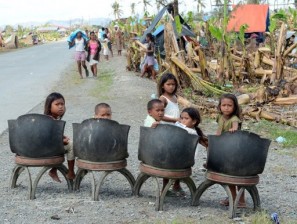
Children sit on improvised chairs as they wait for relief goods in New Bataan, Compostela province on Dec. 12, 2012 nearly one week after the southern part of the Philippines was hit by Typhoon Pablo (Bopha.) As schools open on Monday, Jan. 7, 2013, teachers are faced with the tough challenge on how to lure back students still coping with the devastation brought by Pablo. AFP PHOTO/TED ALJIBE
NEW BATAAN, Compostela Valley—As schools here open on Monday, a week behind schedule, teachers are faced with the tough challenge on how to lure back students still coping with the devastation brought by typhoon Pablo.
Thousands of schoolchildren are supposed to troop to different public elementary and secondary schools in 16 villages here but school officials said the turnout may not reach 100 percent.
“We are having a problem of winning them back,” Marcelino de los Reyes, district coordinating principal in New Bataan schools said. “The children are still scared, their interest (in school) could be waning.”
The Department of Education ordered the reopening of schools in typhoon-hit Compostela Valley and Davao Oriental provinces last Jan. 3, barely a month after schools were shuttered following the destruction wrought by Pablo to these areas.
Schools in all typhoon-ravaged areas have opened their doors to students as scheduled—with Education Secretary Armin Luistro himself visiting schools in Davao Oriental—except in New Bataan.
Continuous rains due to tropical depression “Auring” prompted the local government to suspend classes by two days, as hundreds of New Bataan residents again evacuated to schools, some of them still occupied by those displaced during the Dec. 4 calamity.
Mayor Lorenzo Balbin Jr. said classes might be suspended yet again on Monday “in case the weather warrants.”
“We have learned a harsh lesson already. We don’t want it to happen again,” said Balbin of the Dec. 4 deluge.
Delos Reyes said strong wind and a flashflood spawned by ‘Pablo’ destroyed or damaged practically all of the schools in his municipality.
In the hardest-hit village of Andap for instance, only one of the 15 classrooms of the village elementary school is left standing. At least 37 school children there were killed and over 100 are still missing, according to De los Reyes, citing figures from Andap school authorities.
He said 11 students also died in Cabinuangan while about 50 others are still unaccounted for. Two teachers in this town also lost their lives due to the typhoon.
“The toll on education (caused by the typhoon) was really high,” said Sarah Jane Loney, a district school staff. “What was once a paradise for school children is now a wasteland.”
During her visit here last Thursday, Education Undersecretary Yolanda Quijano pledged the setting up of learning tents that could serve as temporary classrooms.
The United Nations Children’s Emergency Fund (Unicef) has donated learning tents in the two provinces, at least four of which in New Bataan.
Quijano said children’s education has suffered for too much already as a result of the calamity.
“We want to bring back normalcy to children’s education,” she said.
Nenita Lumaad, Compostela Valley schools division officer-in-charge, said specialized learning modules would be used and psychosocial interaction activities would be employed by teachers as a form of stress debriefing to children.
Despite the tough challenge ahead, the school authorities are undaunted.
De los Reyes, the district school chief, plans to give away free school supplies to the children out of his office’s P38,000 monthly maintenance and other operating expense (MOOE) kitty.
Other entities, such as representatives from an Indonesian organization also donated notebooks, pens and other school supplies to at least 2,000 pupils at Cabinuangan Central Elementary School.
“Yes, these are not enough, but it’s just a start,” De los Reyes said.
Amid these challenges, a handful of children were looking forward to going to school again—after a long and somehow, painful vacation.
Jomar Ray Pagsak, a Grade 3 pupil from Cabinuangan village, said he missed his classmates and teachers so he wanted to go to school again.
Pagsak and several other school children had reported to school on Thursday but were sent home after school officials ordered suspension of classes.
“I want to report to class, to see my classmates and friends again,” the 9-year old boy told the Inquirer.